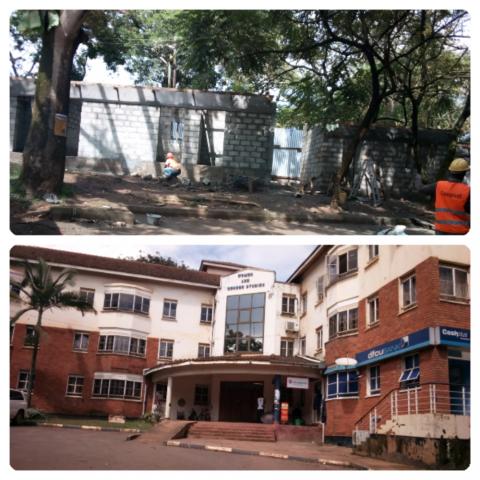New Building Coming up at School of Gender
Submitted by wakaija on

A new building is under construction next to the School of Gender and Women Studies.
Officials at the school say the new three-storey structure is meant to be an extension to accommodate workers’ facilities. These facilities include offices of the Clerk, secretary, project officer and the nurse.
The School of Gender building is strategically located at the heart of Makerere University and under a canopy of tall beautiful trees. The building constitutes lecture rooms, offices, a library and DFCU bank. However, its extension raises questions about the safety of the trees.
Peter Omalla, one of the builders from Complant Engineering and Trade Uganda Limited, says that trees are acting as a barrier and causing problems to their work especially during roofing.
“Personally I would not cut down trees or advise them to be cut but rather let's do what is beneficial. Even the Complant Company itself cares about climate justice,” says Omalla.
By the end of this month the school will be under renovation and the three floors being added. David Peterson Nyote, the Foreman, made a revelation that only one thing is keeping them back.
“We would have finished one floor already just that we are still waiting for the document to be signed by the Department of Estates Makerere University because without it, we can't start.” he says.
Last month, the university hosted the inter-university environmental debate under the theme “Co-existence of development and environmental conservation”.
Students from various universities in Uganda including the hosts Makerere University, Kyambogo University, Uganda Christian University and Cavendish University among others, debated to justify whether Uganda can carry out infrastructural development and at the same time conserve the environment for the future generation.
Pius Okoki, an Environmental Science student at Makerere noted that, “Instead of Industrial establishment which endangers the environment, the government should concentrate on leisure parks to attract tourists as a form of an economic activity which leads to development without harming the environment."
In support of Okoki’s submission, Brenda Uwase, from Kampala International University, added: “Roads and air fields, which are less harming to the environment, can be constructed to facilitate transport of tourist to such leisure parks.”
Luyombo Abassi, a Makerere university law student and a member of the Guild Council, however, argued that theories of tourism and agriculture as prime economic activities in Uganda don't match the facts. He stressed that 68% of Ugandan agriculturalists practice subsistence farming and thus do it for survival, not as an economic activity. He added that even the tourism sector contribution to the GDP of Uganda is quite low.
“Leisure parks work seasonally and employ very few people. More so, they don't produce anything. We can however concentrate on commercial agriculture and put up agro-based industries that also recycle to improve our economic development,” Luyombo added.
The debaters nonetheless came to consensus that there is need for co-existence of both development and environmental conservation.
In his address, one of the guest speakers, Lawrence B. Songa, a parliamentarian and Chairperson Parliamentary Forum on climate change, noted that for conservation and development, the pre-requisite of Peace and security in terms of income, food, water and environmental security are paramount. He cited energy which must be cheap and available, transport in terms of road, air, water and railway, cost of money, mortality and positioning oneself to overcome competition.
- 696 reads
